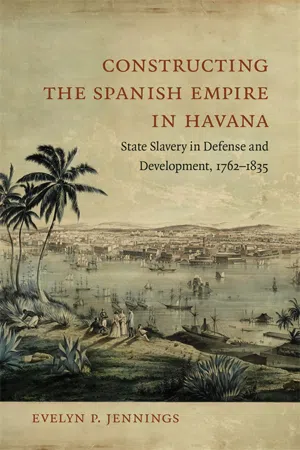
Constructing the Spanish Empire in Havana
State Slavery in Defense and Development, 1762-1835
- 280 pages
- English
- ePUB (mobile friendly)
- Available on iOS & Android
Constructing the Spanish Empire in Havana
State Slavery in Defense and Development, 1762-1835
About This Book
Constructing the Spanish Empire in Havana examines the political economy surrounding the use of enslaved laborers in the capital of Spanish imperial Cuba from 1762 to 1835. In this first book-length exploration of state slavery on the island, Evelyn P. Jennings demonstrates that the Spanish state's policies and practices in the ownership and employment of enslaved workers after 1762 served as a bridge from an economy based on imperial service to a rapidly expanding plantation economy in the nineteenth century. The Spanish state had owned and exploited enslaved workers in Cuba since the early 1500s. After the humiliating yearlong British occupation of Havana beginning in 1762, however, the Spanish Crown redoubled its efforts to purchase and maintain thousands of royal slaves to prepare Havana for what officials believed would be the imminent renewal of war with England. Jennings shows that the composition of workforces assigned to public projects depended on the availability of enslaved workers in various interconnected labor markets within Cuba, within the Spanish empire, and in the Atlantic world. Moreover, the site of enslavement, the work required, and the importance of that work according to imperial priorities influenced the treatment and relative autonomy of those laborers as well as the likelihood they would achieve freedom. As plantation production for export purposes emerged as the most dynamic sector of Cuba's economy by 1810, the Atlantic networks used to obtain enslaved workers showed increasing strain. British abolitionism exerted additional pressure on the slave trade. To offset the loss of access to enslaved laborers, colonial officials expanded the state's authority to sentence deserters, vagrants, and fugitives, both enslaved and free, to labor in public works such as civil construction, road building, and the creation of Havana's defensive forts. State efforts in this area demonstrate the deep roots of state enslavement and forced labor in nineteenth-century Spanish colonialism and in capitalist development in the Atlantic world. Constructing the Spanish Empire in Havana places the processes of building and sustaining the Spanish empire in the imperial hub of Havana in a comparative perspective with other sites of empire building in the Atlantic world. Furthermore, it considers the human costs of reproducing the Spanish empire in a major Caribbean port, the state's role in shaping the institution of slavery, and the experiences of enslaved and other coerced laborers both before and after the beginning of Cuba's sugar boom in the early nineteenth century.
Frequently asked questions
Information
Table of contents
- Cover
- Title Page
- Copyright Page
- Dedication
- Contents
- Acknowledgments
- Prologue
- Introduction
- 1. Slavery and the State: Precedents in Spain and Cuba to 1700
- 2. War, Regeneration, and the Limits of Reform Under the Early Bourbons, 1700–1762
- 3. Fortifying Havana, 1763–1790
- 4. Slaves in the Military, 1763–1800
- 5. Keeping the Peace: Civil Construction and Forced Labor in Havana, 1771–1835
- Conclusion
- Notes
- Bibliography
- Index